To my great grief, Sir Thomas Wyatt the Elder passed away on the 11th of October 1542 at Clifton Maybank House, Dorset, England. He breathed his last at the age of 38-39 – still young, capable of writing more beautiful sonnets which he introduced to the English literature. He is one of my favorite English poets, and on this day I’m always give silent tribute to him.
Thomas was born to Henry and Anne Wyatt at Allington Castle, Kent, England, in 1503, but little is known about his childhood. His first court appearance is registered in 1516 when he became Sewer Extraordinary to King Henry VIII. After receiving an excellent education at the St. John’s College, University of Cambridge, Thomas was back to court, but his career of a courtier seems to have been quite smooth until he accompanied Sir John Russell, Earl of Bedford, to the city of Rome to appeal to Pope Clement VII to have the marriage of King Henry VIII and his first wife, Catherine of Aragon, annulled. According to some sources, Wyatt was captured by the Imperial armies during the barbaric Sack of Rome of 1527, but he escaped by a miracle.
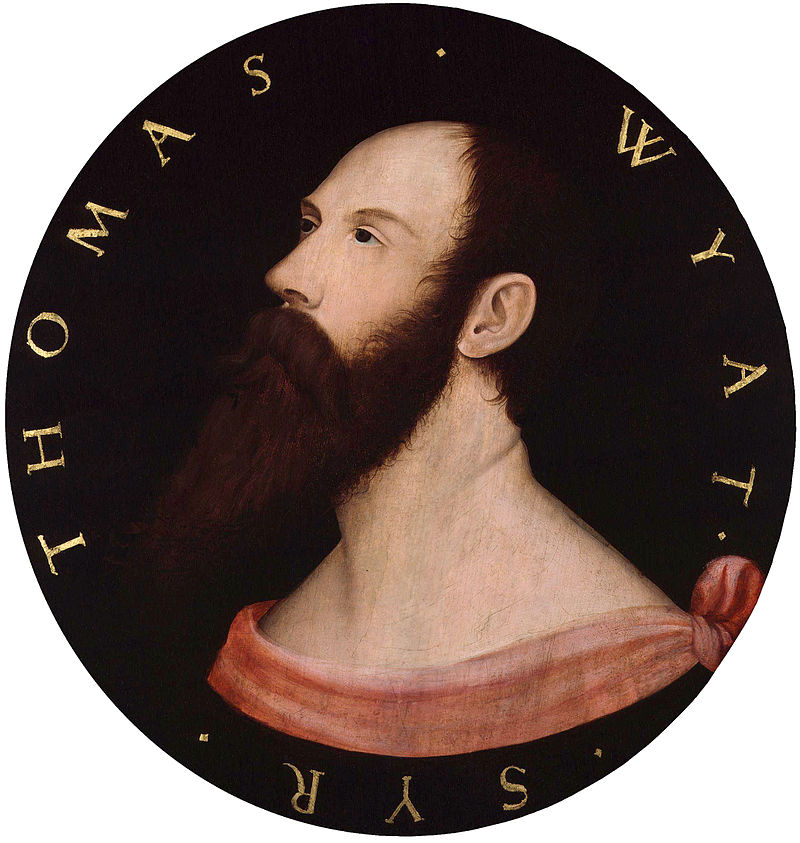
Wyatt’s political and even poetical career was connected with Thomas Cromwell and Anne Boleyn. Thomas Wyatt was one of Anne’s numerous admirers when she appeared at the Tudor court, entrancing men with her French sophistication, elegance, style, wit, and exotic appearance. Yet, it cannot be proved that Anne and Thomas were romantically involved, and I think that if there was something between them, it was nothing more than an act of courtly love on Anne’s part and perhaps deeper affection on Thomas’ part. Nevertheless, the artist dedicated to Anne several verses even before her tragic execution of 1536, which he also reflected in his poems.
Look at this beautiful poem, which definitely speaks about Wyatt’s feelings for Anne:
Sometime I Fled the Fire
Sometime I fled the fire that me brent
By sea, by land, by water, and by wind,
And now I follow the coals that be quent
From Dover to Calais, against my mind.
Lo, how desire is both sprung and spent!
And he may see that whilom was so blind,
And all his labor now he laugh to scorn,
Meshed in the briers that erst was all too-torn.
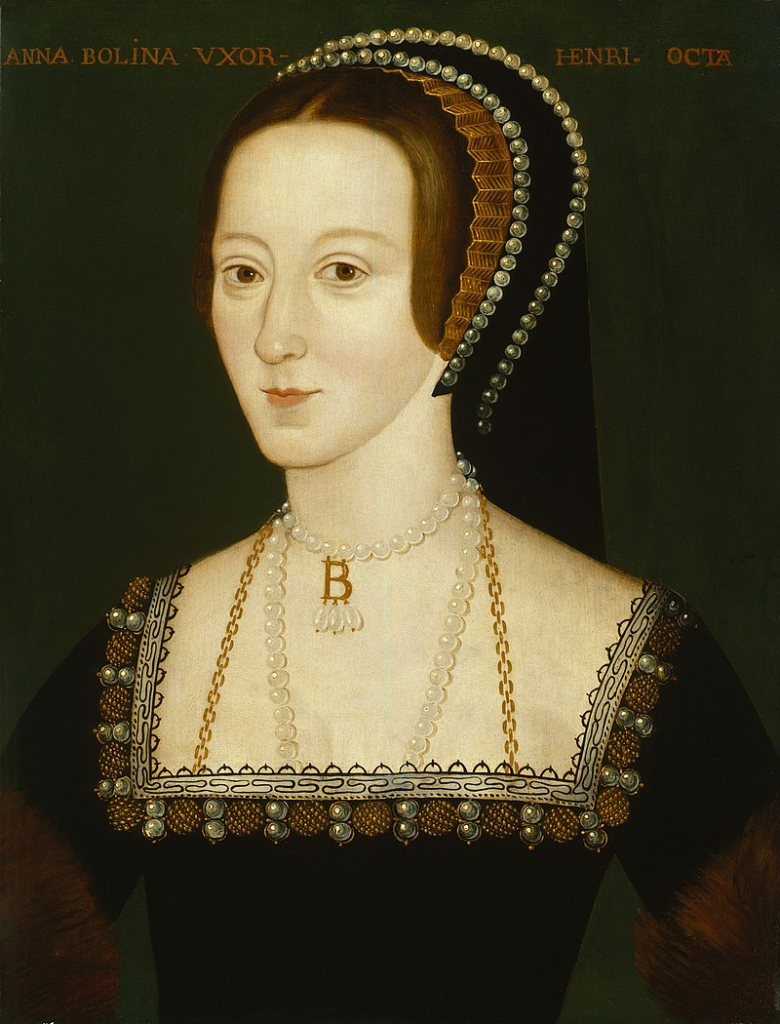
The phrase ‘From Dover to Calais’ implies that the poet thought about Anne Boleyn, maybe during her trip with King Henry to Calais in order to meet with King François I of France. Wyatt is not listed among those who accompanied Henry and Anne to Calais, but he could have been there. I believe that this poem simply refers to Wyatt’s thoughts of Anne and his longing for her – for the extraordinary woman for whom he had romantic sentiments, but who did not love him and whom he could not have because of her entanglement with Henry. This poem could have been written earlier than Anne and Henry’s voyage to Calais: it can suggest Wyatt’s flight from England to the continent during his diplomatic mission to Rome, when he was not only performing his state duties, but was also running away from Anne and his jealousy of her to the monarch. The line ‘by sea, by land, by water, and by wind’ shows that Thomas probably had a long journey, so his voyage to Rome might have been implied. The line ‘desire is both sprung and spent’ might mean that by this time, Wyatt’s yearning for Anne somewhat ebbed away, like a tide rolling back out to sea.
Let’s look at another poem dedicated to Anne. It is called ‘Whoso List to Hunt’:
Whoso List to Hunt
Whoso list to hunt, I know where is an hind,
But as for me, helas, I may no more.
The vain travail hath wearied me so sore,
I am of them that farthest come behind.
Yet may I by no means my wearied mind
Draw from the deer, but as she fleeth afore
Fainting I follow.
I leave off therefore Sithens in a net I seek to hold the wind.
Who list her hunt, I put him out of doubt,
As well as I may spend his time in vain.
And graven with diamonds in letters plain
There is written her fair neck round about:
Noli me tangere for Caesar’s I am,
And wild for to hold though I seem tame.
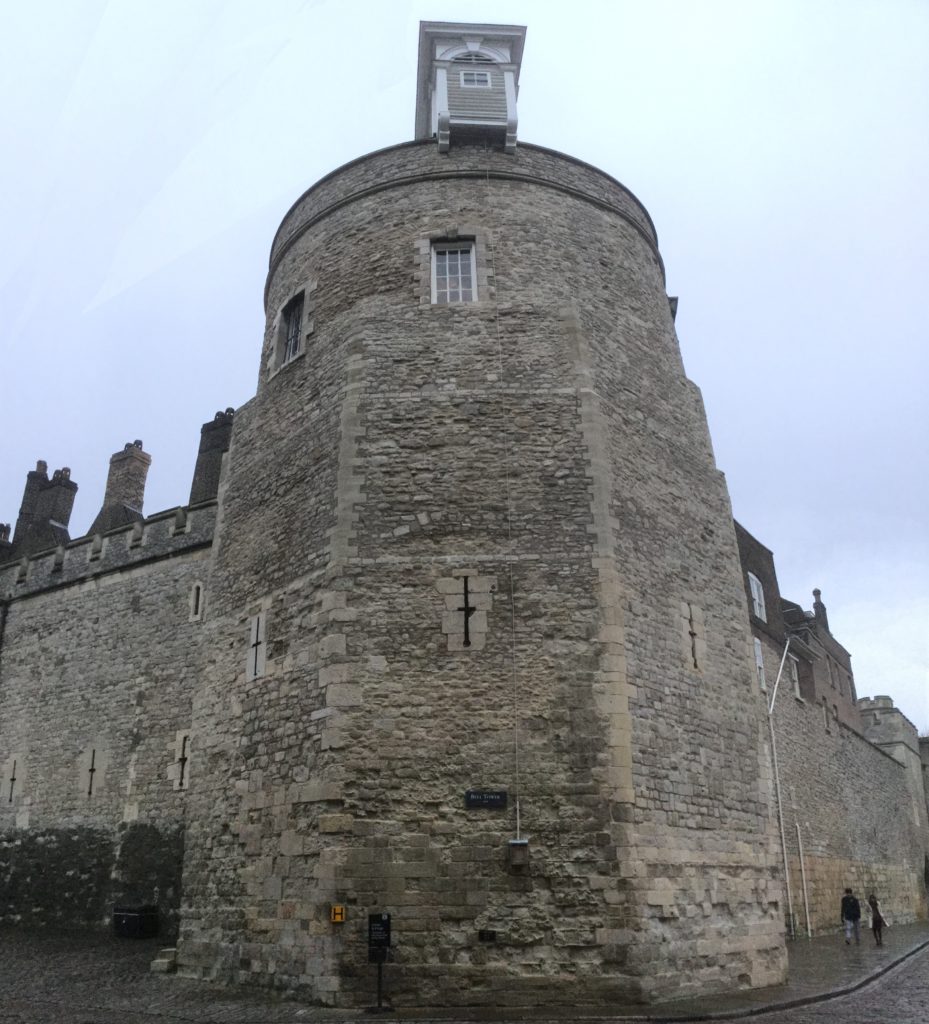
This poem could have been written during the time when Wyatt was one of Anne’s admirers. The line ‘The vain travail hath wearied me so sore’ means that the poet invested a lot of effort into charming Anne, but he still failed. It does not mean that Anne was flippant and unruly. Thomas Wyatt was a married man: he had wed Lord Cobham’s daughter Elizabeth Brooke, who had birthed him a son, also Thomas Wyatt the Younger, in 1521, but later Thomas separated from his wife due to her supposed adultery. There is no way Anne could have had an affair with a married man despite his estrangement from his spouse, and I have no doubt that she remained a virgin during her long courtship with Henry, most likely until their trip to Calais in 1532. The translation of the phrase ‘Noli me tangere’ from Latin to English is ‘Do not touch me,’ which literally means that Anne became an unattainable star for Thomas Wyatt, wishing that he relinquished his hold over her, and the rest of the line ‘for Caesar’s I am’ speaks volumes – Anne’s heart belonged to King Henry, the Tudor Caesar of England, and she could not be with anyone but Henry. The line ‘wild for to hold though I seem tame’ illustrates that Anne, in spite of seemingly being obedient to her father and relatives, had her own opinions and was not afraid to voice them to the world.
During Anne’s courtship with Henry, Wyatt’s career progressed. The poet was made High Marshal of Calais in 1528 and Commissioner of the Peace of Essex in 1532. He was knighted in 1535, yet when Anne outlived her usefulness and Henry decided to dispose of her, Cromwell’s crafty conspiracy resulted in the imprisonment of Anne and George Boleyn, as well as her several other alleged lovers, including Thomas Wyatt. During the time spent in the Tower of London, Wyatt undertook his mental journey to the past, thinking about Anne and her doomed romance with the king. The poet witnessed the execution of Anne Boleyn on the 19th of May 1536 from the Bell Tower. His heart fragmented, his whole being wrapped in chains of bereavement, Wyatt wrote the sonnet‘V. Innocentia Veritas Viat Fides Circumdederunt me inimici mei.’
Who list his wealth and ease retain,
Himself let him unknown contain.
Press not too fast in at that gate
Where the return stands by disdain,
For sure, circa Regna tonat.
The high mountains are blasted oft
When the low valley is mild and soft.
Fortune with Health stands at debate.
The fall is grievous from aloft.
And sure, circa Regna tonat.
These bloody days have broken my heart.
My lust, my youth did them depart,
And blind desire of estate.
Who hastes to climb seeks to revert.
Of truth, circa Regna tonat.
The bell tower showed me such sight
That in my head sticks day and night.
There did I learn out of a grate,
For all favour, glory, or might,
That yet circa Regna tonat.
By proof, I say, there did I learn:
Wit helpeth not defence too yerne,
Of innocency to plead or prate.
Bear low, therefore, give God the stern,
For sure, circa Regna tonat.
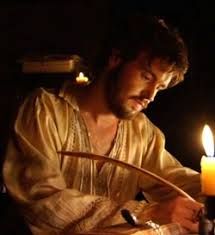
This poem allows us to see the soul of a brokenhearted Thomas Wyatt. The May events of 1536 shocked the artist to his core, and perhaps he still had some feelings for Anne because her unfair and brutal death obviously hit him hard. The line ‘The fall is grievous from aloft’ implies Anne’s downfall from her queenship to a void of nothingness – her incarceration in the Tower on phony charges and her murder. The line ‘These bloody days have broken my heart’ is clear – Wyatt was grieving the loss of Anne and the unjustly condemned men, some of whom were his friends. The poet stated that his youth and all his illusions about life and possible fairness on earth are gone: just look at these lines – ‘My lust, my youth did them depart’ and ‘The bell tower showed me such sight; That in my head sticks day and night.’ Thomas will never forget the executions he witnessed from the Bell Tower. The poem declares that it was worthless to plead guilty or not – the verdict for Anne and her alleged “lovers” was known in advance. Wyatt was nevertheless released later that year, much thanks to the fact that his principal patron was Thomas Cromwell.
His career after Anne’s death was chaotic. Thomas Wyatt regained some of royal favor in 1539 and was dispatched as ambassador to the court of the Holy Roman Emperor, Charles V, in Spain until May 1540. In his poems dated 1539 we can find the poet’s praises of country life and his disdain for foreign courts. Henry’s mercurial temper led to Wyatt’s another disgrace when the poet was charged with treason in 1541 on a revival of charges originally brought against him in 1538 by Edmund Bonner, Bishop of London. It was claimed, most likely falsely, that while having been a diplomat, Thomas Wyatt had been rude about the monarch’s person, and that Thomas had made some deal with Cardinal Reginald Pole, Henry’s kinsman – one who lived in self-imposed exile in Rome and was the king’s opponent and enemy. Thanks to Queen Catherine Howard’s request to the sovereign of England, the poet was liberated and given various offices. However, Thomas got sick during the preparations for the visit of Charles V’s envoy and soon died.
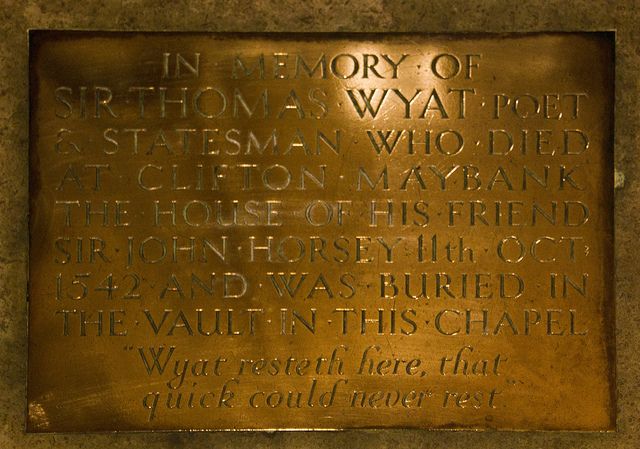
Thomas Wyatt deserves the admiration of all Englishmen. One of his main tasks was to experiment with the English language and to develop its literary powers so that works written in English could rival those produced in other European languages. In other words, he strove to civilize the language and experimented in stanza forms including the rondeau, epigrams, terza rima, ottava rima songs, and satires. Wyatt adored Francesco Petrarch, and much of his poetic output consisted of translations, imitations, and sometimes even replications of Petrarch’s sonnets. Wyatt also used themes about love, death, ephemerality of life, and so on from Petrarch’s sonnets, yet the rhythm in his verses was anglicized and a bit different. Thomas Wyatt is considered a master of the iambic tetrameter, which refers to a line consisting of four iambic feet.
All images are in the public domain.
Text © 2020 Olivia Longueville

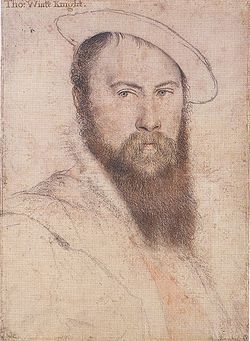




Fascinating
Thank you very much!